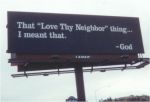Kedoshim 5771 — Holiness Online

love thy neighbor
You shall be holy; for I the Lord your God am holy. …Leviticus 19:2
You shall not curse the deaf, nor put a stumbling block before the blind, but shall fear your God; I am the Lord. …Leviticus 19:14
You shall not hate your brother in your heart; you shall surely rebuke your neighbor, and not allow sin on his account. …Leviticus 19:17
…you shall love your neighbor as yourself; I am the Lord. …Leviticus 19:18
We are commanded to be holy. Does that include in our online behavior?
This week’s Torah reading gives valuable guidance to people who like to comment on Facebook, respond with online article “talkbacks” or who participate in email listservs.
Online discourse frequently sinks to a level that is out and out embarrassing. We have all read rants and raves online that are vicious in tone. I have been personally vilified in talkbacks to op-ed pieces I wrote for the Jerusalem Post; being a rabbi and blogger, anything is “blog fodder,” so I made lemonade out of lemons and gave a D’var Torah on the subject that you can read by clicking here.
On both Facebook and on a “better left unnamed professional association list” I have all too often seen a philosophical (or more commonly, political) debate descend into ad hominem attacks, with people writing the most horrible things about other people’s intelligence, integrity, and paternity. Even people who are supposedly friends, or colleagues.
Even when I’m not the victim, I am grossly offended by such personal attacks, and believe they have no place in civilized discourse. These week’s Torah reading, Kedoshim, gives us guidance on how to conduct ourselves — both online and in person. The problem is much greater online than in person. People will say the most insulting things online — even in front of a large audience. Things they would almost certainly never say in person. It bears remembering that there are real people at the other end of a talkback or Facebook comment who deserve the same respect online as in person.
So what’s the advice from the Torah?
If you think someone is clearly wrong and out of line, the Torah charges us hokeach tokiach et amitecha “you shall surely rebuke your neighbor.” There is nothing wrong with disagreeing with someone — after all, we are taught the schools of Hillel and Shammai had bitter debates with each other, but “eilu v’eilu divrei Elokim chaim,” but both these and those are the words of the living God. And as the verse says, if someone is way wrong you can even rebuke him — nay, the verse charges you must rebuke him.
But there is a way to rebuke. Calling someone names in a public forum is MOST ASSUREDLY not the way to rebuke a person. Rambam (Maimonides) gives us good guidance on how to rebuke someone: privately, reassuring him that it is for his benefit, etc. The challenge of rebuking — and accepting rebuke — is highlighted by a passage from the Talmud: “R. Tarfon said, I wonder whether there is any one in this generation who accepts reproof, for if one says to him: Remove the mote from between your eyes, he would answer: Remove the beam from between your eyes!” Which is followed by a teaching asking whether anyone knows how to administer a rebuke! All of which shows how little human nature has changed in 1,500 years.
Not only is there a particular way to give a rebuke, this week’s Torah reading also cautions us not curse the deaf. And al achat cama v’cama, all the more so, if you can’t curse a deaf person, all the more so you can’t curse someone who can hear the curse. A “deaf person” is someone who won’t hear the curse, therefore it won’t hurt him. Why not curse someone who is deaf? Our rabbis teach us that it is so you won’t be the sort of negative person who goes around cursing other people, which is a bad character trait. How does this apply in our online discussions? Who is that “can’t hear?” Well, for example, if you were cursing Barack Obama, or Benjamin Netanyahu, they are probably “deaf” in that they are unlikely to “hear” your curse, but you still shouldn’t curse, or be textually abusive even to them, because it is a bad character trait.
And last, but far from least, this week are also commanded “love your neighbor as yourself,” the biblical source for the Golden Rule. How would a wise and mature person want to be treated? Well, if you are wrong, you would WANT to be corrected, after all, you would be a truth-seeker. At the same time, you would not want to be cursed or abused, because that is never pleasant.
If you have trouble reining in your viciousness online, it is better to say nothing. As it says in Proverbs, “silence is a fence to wisdom,” or as Mark Twain put it, “better to be silent and be thought a fool than to open your mouth and remove all doubt!”
